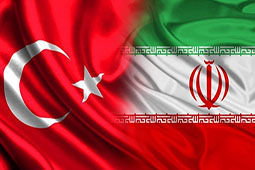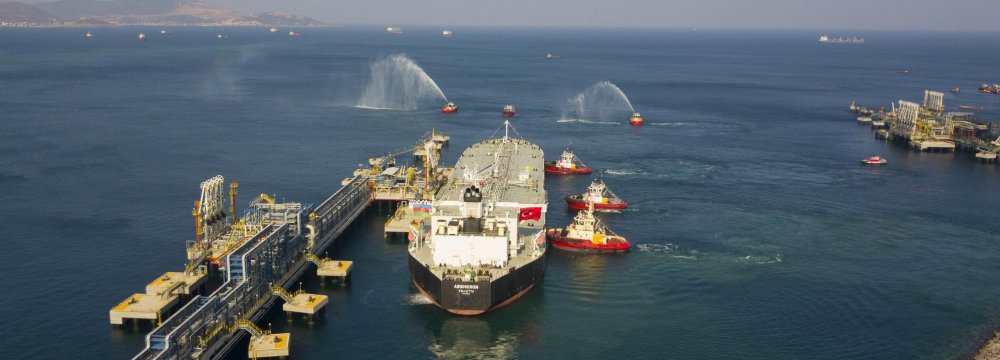
Turkey Granted Waiver on Iran Oil Sanctions


Speaking in an interview with broadcaster NTV, Donmez said oil refiner Tupras was looking at alternatives to avoid any market difficulties.
“The 25 % figure is approximate and Ankara has not yet received an exact figure,” he said, as quoted by Reuters.
He also said Turkey still had a contract to buy natural gas from Iran for five to six years and added that Ankara would continue to buy gas from Tehran.
Washington has pledged to eventually halt all purchases of crude oil from Iran globally but for now it said eight countries —China, India, South Korea, Japan, Italy, Greece, Taiwan and Turkey — can continue imports without penalty for at least another six months. Crude exports account for one-third of Iran’s government revenues.
Positive Impact
The new US sanctions against Iran can have positive consequences for Turkey, an Iranian diplomat told state-run Anadolu Agency.
“This is the best opportunity for Turkish companies to increase their presence in Iran. They can use this benefit to conquer the part of the market that was acquired by European and Chinese companies, “Seyed Hafez Mousavi, the commercial counselor at the Iranian Embassy in Ankara, said.
Mousavi asserted that Turkey and Iran can expand cooperation in sectors such as tourism and investment.
In 2017, bilateral trade volume between Turkey and Iran totaled $10.7 billion, up nearly 11% year-on-year.
In the first nine months of 2018 the trade volume was $7.5 billion.
On trade in national currencies with Turkey, Russia and China, he said the issue is on Iran’s agenda.
“We had good negotiations on this issue. They expressed their readiness to use national currency to work with Iranian companies,” he added.
Mousavi said using the Turkish lira instead of US dollars would also be welcomed by Iranian companies.
“Turkey is our main partner and neighbor, we prefer to use the lira instead of the dollar,” he said.


Newmont nets $100M payment related Akyem mine sale

First Quantum scores $1B streaming deal with Royal Gold

Caterpillar sees US tariff hit of up to $1.5 billion this year

Gold price rebounds nearly 2% on US payrolls data

Copper price collapses by 20% as US excludes refined metal from tariffs

St Augustine PFS confirms ‘world-class’ potential of Kingking project with $4.2B value

B2Gold gets Mali nod to start underground mining at Fekola

Goldman told clients to go long copper a day before price plunge

Copper price posts second weekly drop after Trump’s tariff surprise

Codelco seeks restart at Chilean copper mine after collapse

US slaps tariffs on 1-kg, 100-oz gold bars: Financial Times

BHP, Vale offer $1.4 billion settlement in UK lawsuit over Brazil dam disaster, FT reports

NextSource soars on Mitsubishi Chemical offtake deal

Copper price slips as unwinding of tariff trade boosts LME stockpiles

SAIL Bhilai Steel relies on Danieli proprietary technology to expand plate mill portfolio to higher steel grades

Alba Discloses its Financial Results for the Second Quarter and H1 of 2025

Australia weighs price floor for critical minerals, boosting rare earth miners

Australia pledges $87M to rescue Trafigura’s Nyrstar smelters in critical minerals push

Fresnillo lifts gold forecast on strong first-half surge

US slaps tariffs on 1-kg, 100-oz gold bars: Financial Times

BHP, Vale offer $1.4 billion settlement in UK lawsuit over Brazil dam disaster, FT reports

NextSource soars on Mitsubishi Chemical offtake deal

Copper price slips as unwinding of tariff trade boosts LME stockpiles

SAIL Bhilai Steel relies on Danieli proprietary technology to expand plate mill portfolio to higher steel grades

Alba Discloses its Financial Results for the Second Quarter and H1 of 2025

Australia weighs price floor for critical minerals, boosting rare earth miners

Australia pledges $87M to rescue Trafigura’s Nyrstar smelters in critical minerals push

Fresnillo lifts gold forecast on strong first-half surge














